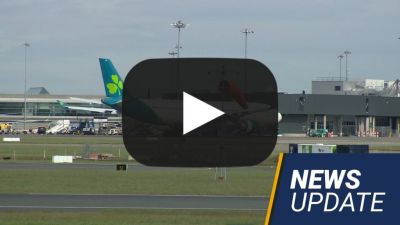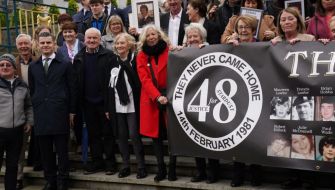The "architect" behind a plan to rob a businessman, who begged to be shot after being badly beaten by men who claimed they were in the Continuity IRA, has appealed his conviction on the grounds that he had pulled out of the enterprise before the attack.
Mayo businessman Edward McAndrew was set upon in a "barbaric" attack by men who beat him with iron bars, demanded money and robbed him at a remote location in Co Louth in 2017.
Last November, William Twomey (58) with an address at Havelock Place, Warrenpoint, Co Down, was found guilty at the non-jury Special Criminal Court of robbery, assault and of demanding money with menaces from Mr McAndrew in Co Louth in December 2017.
Galwayman Twomey was found not guilty of falsely imprisoning Mr McAndrew by detaining him without his consent at One Ferry Hill, Cornamucklagh, Omeath, Co Louth, on or about December 2nd, 2017.
The three-judge court heard that Mr McAndrew, who was also put in the boot of a car, had been lured to Omeath by the gang on the pretence that the men had some plant machinery to sell to him, a plan Twomey put into motion by emailing Mr McAndrew under a false name.
At Twomey's sentencing, presiding judge Mr Justice Tony Hunt said that Twomey was the "initiator of a joint enterprise" but that "results went well beyond" what the defendant had contemplated.
The trial heard that Twomey had nine previous convictions, mostly of a road traffic nature, but also had a burglary conviction from 1984.
Guilty mind
On Thursday at the Court of Appeal, Dominic McGinn SC, for the appellant, said that the Special Criminal Court had set the bar "too high" in looking for a "degree of countermanding or undoing work of common design" when Twomey claims he withdrew from the plan.
Mr McGinn said that for a person to have "mens rea" (a guilty mind) regarding a joint criminal enterprise, it must be present throughout the enterprise "even if it goes beyond the scope of what was intended".
Mr McGinn said that by the time Mr McAndrew was attacked, Twomey had already withdrawn from the situation and had communicated that to another male involved, Anthony Finglas.
In December 2020, Finglas (51) also of Havelock Place, was jailed by the court for demanding money with menaces from Mr McAndrew and was sentenced to four years and nine months after he pleaded guilty.
Mr McGinn said that it was difficult to fix criminal responsibility to Twomey if the intent to offend was no longer there at the time of the attack on Mr McAndrew.
Mr Justice John Edwards said that while Twomey had communicated to Finglas about not being involved in another matter involving a separate male, he said "nothing" to Finglas about Mr McAndrew.
Mr Justice Edwards said: "Every police car in Northern Ireland and the Republic of Ireland has a confidential number you can ring - he doesn't do it."
Mr McGinn said that there was unchallenged evidence at trial that Twomey had contacted the PSNI about the matter and that he had a conversation with a garda he knew who recommended he do so.
Mr McGinn said that Twomey was "exposing himself" to criminal liability when he told the garda what he knew and that the conversation was not a "self-serving" one.
Mr McGinn said the Special Criminal Court had "fallen into error in judgement" regarding the steps needed to reverse or cancel a previous criminal enterprise for Twomey to be considered to have withdrawn.
'Residual liability'
Mr Justice George Birmingham, presiding, said the Special Criminal Court was asked to determine fact and that there was no dispute at the trial on what the law was.
Mr McGinn said it would be an overstatement if the court believed that Twomey should have to unravel everything. The barrister said his client had been charged with completed offences at a time when he had "abandoned" his mens rea.
Mr McGinn said his client had communicated his intent to withdraw to Finglas, gardaí and the PSNI but was still found to have "residual liability".
Mr Justice Edwards said: "If you tell a garda that someone is in non-specific danger without telling them about where or when that danger might be, is that communicating withdrawal? If I ring a police station and tell them I have planted a bomb in a park but that I am not telling you when or where but I don't want to be involved anymore, is that enough?"

Mr McGinn said it "beggars belief" that his client would flag his own involvement to gardaí and expose himself if Twomey had any intent on continuing to be involved in the plan.
Anne Marie Lawlor SC, for the Director of Public Prosecutions, said that the "fruits" of the attack on Mr McAndrew were made "immediately available" to Twomey after the incident. She said Twomey had been "the architect" of the plan and had spoken to a garda he knew only for "advice" around his "supposed withdrawal".
Ms Lawlor said that the garda advised Twomey to contact the PSNI but that there was "no evidence of what transpired there". She said that Twomey did not show evidence of "effective withdrawal", that the law was "perfectly clear on the matter" and was properly understood by the Special Criminal Court when deciding the facts of the case.
Mr Justice Birmingham said the court would reserve judgment in the matter and return as soon as possible.







